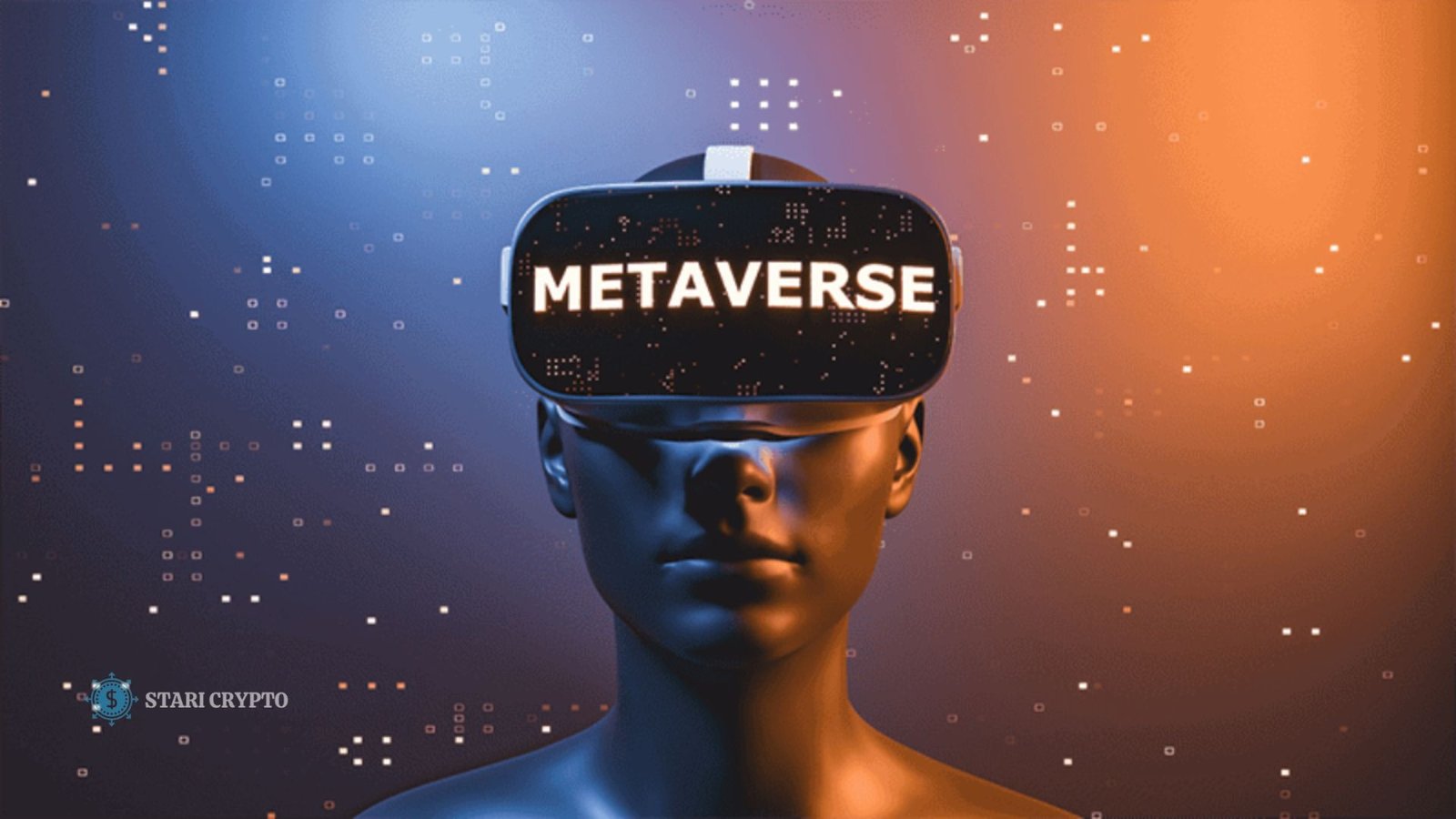Cryptocurrency in the Metaverse: There has been a recent upsurge in interest in the metaverse concept, a digital realm combining AR, VR, and immersive experiences. Cryptocurrencies are a crucial component that is rising to the forefront and fundamental to the growth of the metaverse. Users are venturing into virtual worlds and interacting with others in this vast digital area. The metaverse’s monetary system is based on digital currencies, facilitating ownership, transactions, and governance in virtual economies. In this in-depth study, learn about cryptocurrencies’ function in the metaverse, how they facilitate online trade, and their possible uses, obstacles, and opportunities.
What is the Metaverse?
The metaverse is a shared online environment where people can utilize digital personas to socialize, play, work, and even do business. It is an alternative to conventional web browsing that allows users to immerse themselves in a 3D digital world through virtual reality or augmented reality headsets. Metaverse ecosystems like Decentraland and The Sandbox allow users to purchase virtual land, produce content, and establish communities. For many, the metaverse represents the natural progression of the web towards its next major version, “Web 3.0.”
The Role of Cryptocurrency in the Metaverse
In the metaverse, cryptocurrency is king when it comes to making purchases. Bitcoin and other cryptocurrencies use blockchain technology to make financial transactions decentralized, transparent, and safe. A few ways in which the metaverse is connected to Bitcoin are as follows:
 Virtual Economies and Transactions
Virtual Economies and Transactions
Metaverse platforms use native currencies like Ethereum (ETH), Decentraland’s MANA, and The Sandbox’s SAND. Tokens are used to buy virtual real estate, avatar apparel, and special events and experiences. Blockchain networks verify and record transactions, making the virtual economy transparent and safe. Peer-to-peer transactions without intermediaries constitute a significant benefit of cryptocurrencies. Digital assets can be traded directly between users, eliminating the need for banks and their costs.
Ownership and NFTs
A cryptocurrency called non-fungible tokens powers the metaverse’s ownership structure. Virtual real estate and art are NFTs. Buying a blockchain-secured NFT transfers ownership. Digital ownership allows metaverse economies to trade virtual goods; hence, NFTs are crucial. Innovative NFTs allow creators to monetize their work. Artists, musicians, and developers can sell NFTs of virtual things to metaverse consumers. Content creator pay rises as a decentralized creative economy develops.
Decentralized Finance in the Metaverse
Decentralized finance, or DeFi, uses blockchain to provide financial services without banks or governments. DeFi expands metaverse money management, lending, and passive income options. Staking cryptocurrencies earns interest or prizes. DeFi systems enable metaverse real estate rentals and sales. DeFi services enable yield farming, liquidity provision, and decentralized lending in the metaverse ecosystem. Finance combined with immersive digital experiences is a new frontier in economics and wealth management.
Governance and DAOs
Decentralized autonomous organizations (DAOs) are becoming popular in the metaverse for collective virtual space governance. Blockchain-based DAOs distribute governance tokens to users to vote on platform upgrades and community rules. This decentralized governance paradigm lets users shape their virtual environments. DAOs like Decentraland allow landowners to vote on the platform’s evolution with governance tokens, democratizing virtual environment control.
Challenges Facing Cryptocurrency in the Metaverse
Despite its great possibilities, integrating cryptocurrency into the metaverse presents several difficulties. These issues must be resolved to guarantee a seamless, safe, scalable virtual economy.
Volatility of Cryptocurrencies
One of the most significant hurdles is the volatility of cryptocurrency prices. The value of tokens used in the metaverse can fluctuate dramatically within short periods, making it difficult for users to predict the real-world value of their virtual assets. For instance, if the price of Ethereum or another cryptocurrency drops suddenly, users may lose significant value in their virtual holdings, which could deter new participants from engaging in metaverse transactions.
Regulatory Uncertainty
The metaverse may encounter regulatory hurdles similar to those faced by other cryptocurrencies. Governments everywhere struggle to control virtual economies, digital currencies, and NFTs. Many worry that decentralized financial systems could lead to fraud, tax evasion, and money laundering. In the future, cryptocurrency-based metaverse platforms may see their growth and stability threatened by these legislative issues.
Technical Barriers
Although it has already made a considerable impact, blockchain technology remains in its infancy. Since blockchain networks aren’t designed to process massive transactions efficiently, scalability is still a big problem. Metaverse economies may experience sluggish processing times and hefty transaction costs. Another issue is that fewer tech-savvy people may find it challenging to connect with the metaverse due to the complexity of blockchain technology and their unfamiliarity with Bitcoin.
The Future of Cryptocurrency in the Metaverse
Notwithstanding these obstacles, the metaverse has tremendous promise for cryptocurrency in the future. Metaverse transactions will likely become faster and cheaper as scaling solutions such as Ethereum 2.0, layer-2 networks, and cross-chain interoperability improve blockchain technology. As virtual worlds develop further, more cryptocurrency applications will crop up. Digital identity verification using blockchain technology is one potential solution to protect users’ privacy and data security better.
 The metaverse. Integrating tokenized real-world assets into the metaverse could also enable users to trade real-world items within the virtual realm. This could happen with stocks or property, for example. The growing integration of cryptocurrencies with the metaverse will profoundly change online socializing, commerce, and interaction. As virtual economies driven by digital currencies expand, entrepreneurs, investors, and regular people will have more options to join a decentralized global marketplace.
The metaverse. Integrating tokenized real-world assets into the metaverse could also enable users to trade real-world items within the virtual realm. This could happen with stocks or property, for example. The growing integration of cryptocurrencies with the metaverse will profoundly change online socializing, commerce, and interaction. As virtual economies driven by digital currencies expand, entrepreneurs, investors, and regular people will have more options to join a decentralized global marketplace.
Also Read: Cryptocurrency Tax Rules And What You Need to Know?
In Summary
Cryptocurrency makes secure, decentralized transactions in virtual economies possible, revolutionizing the metaverse. Virtual real estate and NFTs are only two examples of digital assets users can purchase, sell, and trade on this platform. There are new monetary possibilities in the metaverse with blockchain-based decentralized finance (DeFi) services like staking and lending. Nevertheless, obstacles such as unpredictable cryptocurrency prices, unclear regulations, and technological hurdles continue to be a problem. Despite all these problems, cryptocurrencies will be pivotal in how online economies develop in the years to come.
FAQs
Q. What is the role of cryptocurrency in the metaverse?
Ans: Cryptocurrency enables secure, decentralized transactions within virtual economies, allowing users to buy, sell, and trade digital assets like virtual real estate and NFTs in the metaverse.
Q. What are NFTs, and how do they relate to the metaverse?
Ans: NFTs (non-fungible tokens) represent ownership of unique digital items within the metaverse. They are used to buy, sell, and trade assets like virtual property, art, and in-game items.
Q. What are the benefits of using cryptocurrency in the metaverse?
Ans: Cryptocurrencies provide enhanced privacy, lower transaction fees, and decentralized control, allowing users to engage in peer-to-peer transactions without intermediaries.
Q. How do DAOs function in the metaverse?
Ans: DAOs (decentralized autonomous organizations) allow users to govern virtual spaces by voting on critical decisions through governance tokens, creating a decentralized form of management.
Q. What challenges does cryptocurrency face in the metaverse?
Ans: Cryptocurrency faces challenges like price volatility, regulatory uncertainty, and technical limitations, which must be addressed for seamless integration into the metaverse.

















